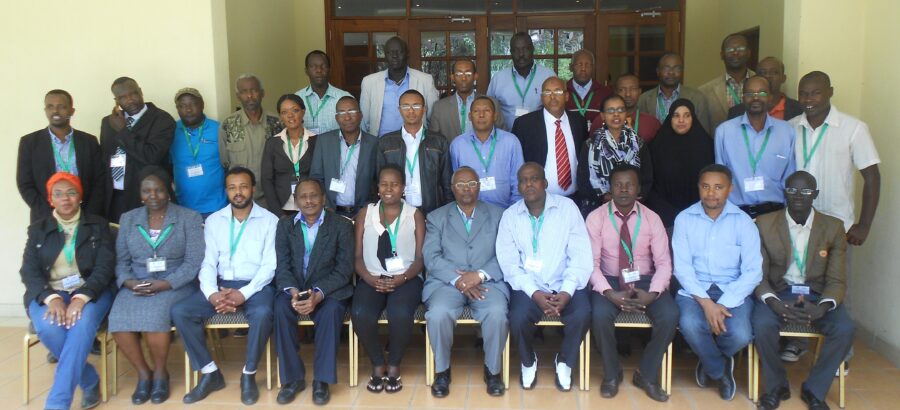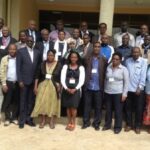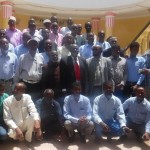- Introduction
The role of media in any development process cannot be overemphasized. In addition, the power of media is phenomenal and effective in raising awareness, changing behaviors, mobilizing public opinions and resources, as well as influencing policies and setting agendas.
At the same time, media practitioners, newsmakers and celebrities can be instrumental in championing various causes including the drought resilience agenda, especially the importance of pastoral areas and livestock development. Realizing that periodic droughts, some of which have turned into famines have been causing disproportionate loss on lives and livelihoods, especially in arid and semi-arid areas of IGAD Member States, multiple coordinated resilience measures are being employed to ensure droughts do not necessarily become famines.
Given that the media also plays a vital role in mainstreaming disaster risk management approaches through public education and responsible reporting, it was therefore proposed that a regional workshop aimed at training and equipping national coordinators and selected media gatekeepers with dynamic skills in disaster risk management reporting. The workshop is expected to complement national sessions to forge partnership and sustainable interaction between the coordinators and the media both at national and regional levels.
Participants at the workshops included news and feature writers and editors, radio and TV producers, as well as senior representatives of the specialized institutions of IGAD.
- Objectives
The two-day workshop aimed to:
- Train print and electronic media journalists to track and report on drought resilience issues with a special focus on importance of arid and semi arid areas of the IGAD region,
- Promote the drought resilience agenda through targeted newsmakers and celebrities,
- Establish a tracking mechanism to monitor drought resilience stories desegregated to show the different sub-sectors and issues, and
- Propose criteria for awarding print and electronic media champion who have written articles and produced programs on drought resilience issues annually during the IDDRSI General Assembly.
- Expected Outputs
The following outcomes are expected after two days of deliberations:
- 50 print and electronic media journalists, celebrities and national coordinators trained on importance of reporting drought resilience issues with special emphasis on pastoral areas and livestock development, and
- A tracking mechanism established to monitor news and feature stories on drought resilience, pastoral areas and livestock development at national and regional levels in print, electronic and new media platforms.
- Proceedings
The first of its kind, the workshop was held at the Lake Naivasha Country Club Hotel on 10th and 11th August 2015 attracting over 30 participants drawn from public and private print and electronic media outlets from IGAD member states, as well as representatives from the IGAD Secretariat, ICPAC, IDDRSI and ICPALD.
Dr Solomon Munyua, the Acting Director ICPALD, who welcomed the participants to the workshop, thanked them for honoring the invitations, and officially opened it on behalf of the IGAD Executive Secretary. He pointed out the importance and the rationale behind the organization of the regional workshop.
Thereafter, the lead facilitator asked all participants to introduce themselves, before presenting the workshop objectives and expected outcomes.
- Day One (10th August):
After the opening remarks and presentation of the workshop objectives, Dr John Kabayo outlined the work of IDDRSI and Dr Munyua did the same for ICPALD. These were followed by plenary session of questions and answers on the two specialized institutions of IGAD.
The founder of Star FM, Mohamed Osman shared his experience on radio production with a focus on development issues. This was complemented by experiences in Djibouti and Ethiopia.
In the afternoon, participants watched a documentary on livestock rearing in Botswana for beef by a renowned television producer, Alex Chamwada who later shared his experience in development journalism. Another TV producer, Josephine Wareta who works on a farming program transmitted weekly by the Kenya Broadcasting Corporation (KBC) also shared some of the common challenges they face and how they have been able to overcome them.
These presentations elicited a lot of interest and a thought-provoking plenary discussion ensued.
After engaging in the plenary discussion for some time, the participants were divided into three groups for further discussions focusing on three areas, i.e. networking and partnerships, capacity building and training, and tracking and rewarding.
Group work and discussions went on until the end of the day. The group rapporteurs prepared their reports for presentation in the plenary the next day.
- Day Two (11th August):
The second and final day started with presentations from the three group rapporteurs. The highlights of the group work are as follows:
Networking and Partnerships
- Baseline surveys should be conducted to understand and appreciate the national and regional media institutional landscapes.
- Co-productions, sponsorships and production grants should be made available to encourage and support broadcast media producers.
- IDDRSI and ICPALD should organize an exchange programs and create opportunities to expose media practitioners to their activities.
- These media activities both at national, cross-border and regional levels should be evaluated during post-mortem and follow-up sessions.
- A depository of stories and a drop box of other media productions should be established for learning purposes and archiving.
- IDDRSI and ICPALD should contribute to special pullouts and supplements in print media during commemorative days, such as world environment day.
- The two specialized institutions should also develop strategic plans to market their activities through the media.
- A group email system of all media practitioners who have shown interest should be created and social media platforms utilized to ensure continued interactions and exchanges.
Capacity Building and Training
- Toolkits and style guides with information (facts and figures) of drought resilience and pastoralism should be developed and made available to media practitioners.
- IDDRSI and ICPALD should disseminate these toolkits and style guides through periodic skills development and training sessions.
- All projects, both at national and regional levels should have sustainable media component budgets to ensure adequate engagement and promotion.
- IDDRSI and ICPALD should endeavour to promote and advocate for policy, institutional and human development in the IGAD member states including the media outlets.
- Study tours and mentorship programs should be established to expose media practitioners on the activities of IDDRSI and ICPALD at all levels.
- Media practitioners who have demonstrated interest in the issues should be given scholarships, fellowships and internships to enhance their knowledge.
Tracking and Rewarding
- Interest and needs assessments of media practitioners should be conducted both at national and regional levels to plan engagement programs.
- Media monitoring should be carried out continuously to assess quality, quantity and diversity of coverage.
- Based on these assessments, surveys and monitors, outstanding media practitioners should be recognized through established award schemes to celebrate excellence.
After the presentations, participants were allowed to make further contributions and additional comments in the plenary.
Ramadhan Khamis, a community media and development activist shared his experience through two documentaries. One on the camel caravan used to promote peace among pastoral communities in the Ewaso Nyiro basin and the other on the intrigues of media operations.
This was complemented by the print media experience of Fred Oluoch, a development writer with The East African – a regional weekly newspaper. Islam Algassim, a development blogger and Faisal Elbagir, a human rights journalist also shared their experiences.
A plenary discussion ensued, bringing out more experiences from the participants. Due to public demand, the facilitator was asked to make the presentation on development journalism and communication that had been shelved on the first day.
Thereafter, Edmealem Shitaye, the IDDRSI National Coordinator for Ethiopia summarized the recommendations and the way forward outlined below. Finally, Dr Ayan Mahamoud, the IDDRSI Coordinator for Regional Progamming officially closed the workshop with a few remarks.
- Recommendations and Way forward
As a way forward, it was recommended that:
- Awareness should be created about regional policies and initiatives, especially those involving cross-border areas and communities in the IGAD member states;
- An inventory of the media landscape (local and regional) should be undertaken for planning and engagement;
- Follow up consultative meetings with the media should be organized on its role in drought resilience and pastoralism development at national level;
- Existing gaps and challenges should be assessed in order to strategize and capitalize on the media opportunities in the member states and the region;
- Similar training workshops should be conducted for media practitioners at national level and national media platforms established;
- Toolkits, manuals and style guides should be developed for capacity building interventions and to equip media practitioners with necessary information; and
- All communication and media units of IGAD should be aligned with the existing development initiatives including IDDRSI.






